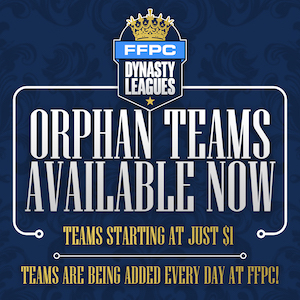Michael F. Florio provides his tiered positional rankings for PPR, half and standard fantasy football leagues and explains the best draft strategies on how to use them.
Rankings are probably the most overrated aspect in fantasy sports. And most, if not all players fall victim to them at some point in their fantasy playing career. That’s probably not what you expected to read when you clicked on a fantasy football rankings article. But, the truth is if you are just taking the highest-ranked name on a list, you are doing things very, very wrong.
For those of you who have watched The League (and those who haven’t, should!) you do not want to be like Kevin in that one episode where it's revealed he does whatever a set of rankings tells him to do. Many drafters have fallen victim to this. Sometimes you will even see a drafter pass on a player they feel really good about, just because another name was ranked higher. That is a mistake and far too many people make it.
Rankings definitely have their place in fantasy football, and they do not just exists to get people to click on the link. The best way to utilize rankings is to help pair it with roster construction and to help figure out position scarcity throughout a draft.
Featured Promo: Looking for some more fantasy football action? Adopt a dynasty orphan team over at FFPC. Sign up today and get $25 off any FFPC league. Sign Up Now!
Know Your Team Needs
Knowing your team needs sounds simple, but it is more complicated than it seems. I do not just mean look at your roster and pick out which positions you need. That is always important and it’s why I wrote a whole section on using tiers to help draft your team (see below). But, you should also be worrying about how much upside and safe players your team has. You should be using that time in between picks to go over your team and identify the type of players you have drafted.
Last year, I changed my draft strategy up to target primarily high-upside players in the middle to late rounds. I will have another article on that this season, but in the meantime, here is where treating the rankings as more than just a list of names that needs to be followed comes into play.
In the early rounds, most of the players drafted come with a combination of a safe floor, but high upside. It is after those top names are drafted that you will start to identify certain players by what they bring to your fantasy team. A player such as JuJu Smith-Schuster, Tyler Boyd, or Jarvis Landry are receivers that I view as safe floor plays.
They will see steady work each week and give you a pretty useful performance. But, will they go off and win you weeks single-handedly? Will they greatly out live their draft day price and help lead your team to a championship? No, probably not. But that does mean they are not useful fantasy pieces.
The thing is, too many players like this on your roster can result in an overly "safe" team. You may have a high floor each week, but good luck beating those higher-scoring teams, especially in the playoffs. Too many safe players and suddenly you are building one of those fantasy teams that will finish somewhere between fourth and sixth in your league. Maybe you win a playoff game, but a championship? You will need a lot to break right, including likely another team underperforming against you, to pull that off.
I know what you are thinking - can’t I find breakout players off the waiver wire? Yes, that is true. But, if you have a team of safe players, they present a floor that you view as useful, in case you ever need to start that player. Holding onto safe players on your bench naturally leads to less lottery tickets on the waiver wire, which leads to a smaller chance of finding those difference makers.
Now, if you take a lot of risks in a draft, you become a high ceiling team, with little floor. While I am the kind of drafter (and ranker) who values upside more than a safe floor, I will admit that if you chase purely upside in a draft - there is a lot that can go wrong. We see it yearly where players are hyped up and then fail to deliver. You do not want to purely rely on upside and target nothing else. There needs to be some balance on all fantasy teams.
Lets use JuJu Smith-Schuster as an example again. You can look at my PPR rankings and see that I have him ranked ahead of Chase Claypool. Claypool is the more explosive option, however, and if he sees an uptick in volume there is no denying he has a huge ceiling. The two also happen to be drafted around one another.
If you are on the clock and debating which of those two you should grab, you would be wise to look at the other receivers you have drafted so far. Feel really good about them as weekly starters in your lineup? Well, then go with the upside play in Claypool as you already have some set options for your starting lineup. But, lets say you look and realize you took a shot on a player who has some injury history or a young player or a player in a new situation and realize, while you like the players yo have, there is some volatility there. Well, that would be a situation to play it safe and grab Smith-Schuster, who you know you can plug into your lineup in any week and get a safe floor out of him.
This to me is the biggest advice on how to use rankings. Understanding that they can be better utilized if you treat them as a guideline and help find the best need for your team, rather than as a list that you must follow to a tee.
Use Tiers
This is the easiest way to use rankings. As you will see below, all of my positional rankings are done in tiers. Some tiers are small and consists of just two players, while others contain 20 names. The deeper into the rankings, the more names that will appear in a tier, as there are less difference makers that stand out. But, tiers are important because they help you clump players with similar expected production together. It also helps you notice when a talent drop off is about to occur at a position.
That last part is especially important. If you are on the clock and debating between two players at different positions, the tiers should greatly come into play. Let’s say you are debating between a running back and a wide receiver. Check out the tier that those two players are ranked in and then see which set of tiers have more players left on the board.
If the RB you want is the last of a tier or one of the two left, yet there are four or five wide receivers still in that group, you should take the running back and know you will get a similarly ranked WR in the next round. Tiers simply help you identify which positions offer the most value at a specific point in the draft and which are starting to thin out.
Also, when it comes to tiers remember that you want to be towards the end of them, not the first reaching into a new tier. What does that mean? Well, it pretty much means do not be reactionary, but rather hunt for value in drafts.
Let's say there was a WR you were hoping would make it to you and he gets drafted right before your pick. You look over the tiers and notice he was the last player still on the board from his group. What do you do? Many people make the mistake of moving down to the next tier and drafting the highest-ranked player. But, that tier is identifying that there has now been a talent/production drop off at the position. So while you think you are getting a player ranked just below the one that you wanted, what you are actually doing is paying basically the same draft capital for a player that you have already identified is not in the same tier of the one you wanted.
Rather than be the first to jump into the next tier, pivot and take a player at another position. In the next round, after others have started to dive down into the next receiver tier, you can grab a similarly ranked player.
Rankings Caveat
Before you dive fully into my rankings - I did want to explain how I conduct my rankings. I do not rank players based on how I project they will finish the season. So much of that comes down to health. I mean, to be an RB2 last year you pretty much had to stay healthy. Instead, I rank players in the order I would draft them in.
I have done a ton of drafts already and will be in a lot more in the coming months. If I start to feel differently about some players in these drafts, I change their ranking to reflect the order I would draft these players in.
As stated above, I am also a drafter that prioritizes upside over a safe floor, especially in the middle to late rounds. It is why players that are classified as safe, such as Jarvis Landry, will be lower in my rankings than others. Landry is also very likely to finish higher than I have him ranked, but his 12 fantasy PPG is not going to lead me to a title. I would rather take a shot on a player like Mike Williams, who I believe could give me weekly WR2 numbers if things break right for him.
Now that you know what goes into these rankings and the best ways to use them, here are my 2021 fantasy football rankings for PPR, half and standard formats!
Michael Florio's Draft Rankings
Make sure to follow me on Twitter, @MichaelFFlorio
Download Our Free News & Alerts Mobile App
Like what you see? Download our updated fantasy football app for iPhone and Android with 24x7 player news, injury alerts, rankings, starts/sits & more. All free!

More Fantasy Football Analysis
Check out all of RotoBaller's fantasy football rankings. Staff rankings are updated regularly for all positions and include standard formats, PPR scoring, tiered rankings and dynasty leagues.





 RADIO
RADIO

























